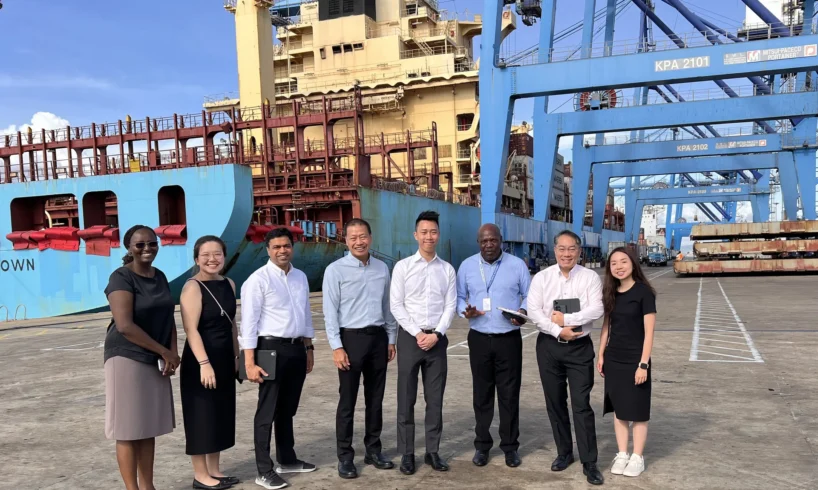
AS TRADE tensions and supply-chain disruptions reshape the business landscape, Singapore companies must look beyond traditional markets for sustainable growth. Africa’s growth trajectory presents a compelling story.
During my visits to Africa, I was struck by the continent’s remarkable potential for growth, driven by its natural resources, demographic advantages, expansive consumer base and the innate creativity of its people.
For instance, Kenya – which I visited in March – has become East Africa’s technology powerhouse. There, innovations in mobile money are changing how millions manage their daily transactions.
This dynamism is not unique to Kenya. While Africa is not homogeneous, similar stories of development and opportunity are unfolding in other parts of the continent.
By 2050, Africa’s population is expected to reach 2.5 billion, with African youth making up a third of the global youth population. The continent’s economy is projected to grow by 3.6 per cent this year, above the global average of 2.4 per cent.
This momentum is reflected in Singapore’s bilateral trade with the continent, which grew from US$9.1 billion in 2020 to US$13.7 billion in 2024.
A NEWSLETTER FOR YOU
Friday, 8.30 am
SGSME
Get updates on Singapore’s SME community, along with profiles, news and tips.
Overcoming hesitance
Yet, despite Africa’s potential, many Singapore companies remain hesitant, often deterred by distance, perceived risks and unfamiliarity.
Overcoming these barriers requires companies to make a fundamental shift in their mindset and approach to new markets beyond our traditional neighbourhood.
My work in helping companies internationalise, under Enterprise Singapore, has shown me how businesses can enjoy early-mover advantages and build scale when they take the road less travelled.
Kitchen-appliance supplier Newmatic, for instance, faced a highly competitive market in Singapore. In 2015, it had the opportunity to partner with a distributor to enter Kenya. Since then, it has opened 14 showrooms across Kenya, Tanzania, Uganda, Angola and Nigeria.
Doing business in Africa comes with challenges, from currency volatility to regulatory complexities.
But companies would face similar challenges when entering any market – and can overcome them by investing time to understand local market nuances, conducting thorough due diligence and developing targeted strategies for mitigation.
Where the opportunities lie
For companies ready to venture into Africa, the growing focus on sustainability is creating new opportunities.
One major area is the emerging carbon economy, within which Africa’s vast natural resources position it as a key player. Singapore sees Africa as an important partner here, and has signed implementation agreements with Ghana and Rwanda.
Besides carbon trading, there are opportunities in project development, consulting and carbon services. This potential attracted 22 Singapore-based companies to join an inaugural carbon-credits business mission to Ghana in July 2024.
Among them was HydraX, which specialises in capital markets infrastructure. Its software enables countries to develop registries, exchanges or distribution platforms for carbon credits trading under Article 6 of the Paris Agreement.
Beyond sustainability, Africa’s digital transformation is unlocking opportunities across sectors. The continent’s young, mobile-first population drives demand for innovative digital solutions.
Riding this wave is Singapore-based fintech Thunes. Its cross-border payment network enables transfers to over three billion mobile wallets globally, connecting users across Africa and the rest of the world.
Its partnerships with leading mobile money platforms in Africa have enhanced financial access, enabling real-time payments across the continent.
As cities across Africa expand, there is growing demand for integrated urban planning, infrastructure development and smart-city solutions. This creates natural synergies with Singapore’s expertise in sustainable urban planning and solutions.
Surbana Jurong has been supporting Africa’s development through its master planning, urban-design and complex engineering capabilities. SMEC, part of the group, has played an integral role in delivering major infrastructure projects across the continent, including the Nairobi expressway project in Kenya and the Msikaba bridge in South Africa.
Opportunities are also being created by Africa’s manufacturing drive.
Amid global supply chain shifts, the continent presents a potential manufacturing base for companies seeking resilience. Many African nations are also prioritising local production to meet rising consumer demand and reduce import dependence.
All this creates opportunities for Singapore companies across the manufacturing, logistics and energy sectors.
Singapore-headquartered conglomerate Tolaram, for example, began manufacturing Indomie instant noodles in Nigeria and Ghana through a joint venture with Indofood.
Recognising the continent’s manufacturing potential, Tolaram then partnered with Kellanova to produce Kellogg’s cereals and instant noodles for Africa and the Middle East. Today, it has grown into one of Africa’s largest manufacturers of fast-moving consumer goods.
Another example is Singapore-based agribusiness company Valency International, which recently established a US$40 million cashew processing plant in Cote d’Ivoire. The plant will process 45,000 tonnes of cashews annually and create over 2,000 local jobs.
Gearing up for entry
In today’s business landscape, the question of engaging Africa has shifted from whether to do so, to how to do so.
The continent is emerging as a strategic frontier market, driven by strong consumer demand while serving as a gateway for regional and global trade.
Early movers who invest time to understand these markets will have distinct advantages.
Companies can leverage Enterprise Singapore’s Overseas Centres in Johannesburg, Nairobi, and Accra for on-ground support to navigate the intricacies of African markets. Through these networks, we facilitate partnerships and identify business opportunities.
The upcoming Africa-Singapore Business Forum will further catalyse connections, bringing together businesses from both continents to explore new possibilities.
As global economic dynamics shift, Africa represents not just an alternative market, but also a strategic imperative for Singapore companies’ long-term growth. The opportunities are clear; the time to act is now.
The writer is deputy managing director of markets at Enterprise Singapore





